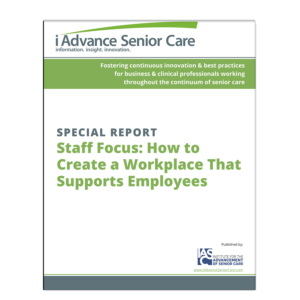Empowering the CNA
| BY LOIS BEATTY, RN, BSN |
| Empowering the CNA With encouragement, CNAs can teach others |
| Have you ever wished that there were enough resources and personnel to improve some of the services that your facility offers? Wouldn’t you like to make mandatory in-services more interesting or present policies in a new way? Unfortunately, head nurses are overwhelmed, department heads have no time, and staff nurses say they have too much to do. But these goals can be achieved if your direct-care staff are willing and able to help. How about involving the nursing assistants? Nursing assistants can take on this new challenge and do a fantastic job. Why not? They know everything that goes on in the facility regarding residents and families because they spend more time with them than any other team member. Residents and family members often are more comfortable telling them things that they might not tell other staff members. At Broadway House for Continuing Care in Newark, New Jersey (an affiliate of the University of Medicine and Dentistry of New Jersey), we’ve taken a fresh look at nursing assistants as a long-term care resource. Outside the workplace, direct caregivers take on various roles. They run households, maintain budgets, hold positions in civic organizations, participate in church activities, and serve on school PTAs. They have a multitude of skills that we have not accessed. Right in our midst are valuable unpolished jewels waiting to sparkle. Broadway House is New Jersey’s only specialized HIV/AIDS nursing care facility. Our mission statement embraces the concept of empowerment, which started with a program called Strength for Caring. A major pharmaceutical company wanted long-term care facilities statewide to initiate a program focusing on the caregivers of people with HIV/AIDS. Strength for Caring outlined how caregivers should set aside time for themselves by practicing relaxation techniques, how they can recognize burnout, and how the resident feels about having HIV/AIDS. In 2003, when a four-day preparatory meeting was held in Chicago, instead of having nurses attend, we gave two exceptional CNAs the opportunity to represent Broadway House. They were the only CNAs representing a facility at the meeting, and they returned home excited, energized, and eager to share the concepts they learned. Because this was the first information presentation to be led by nursing assistants, we pulled out all the stops to publicize the event. Flyers were distributed throughout the facility, posters featuring photos of the presenters were placed at the facility entrance on large golden easels, and invitations were sent out to local facilities. The CNAs’ work schedules were adjusted to provide ample time for them to practice their presentation. At first, rehearsals were a little scary for them but, as they became comfortable with the material, their confidence grew. Standing behind a podium and speaking into a microphone put them in a position of authority, acknowledging them as experts on the subject-individuals with a voice, important team members. As they practiced, the administrative staff and the CNAs’ peers would stop by to offer words of encouragement that not only made them feel good, but also valued. As the presentation date drew near, the excitement grew. Our CNA presenters received corsages to wear on that special day, and their families were invited. Every department came out to support their coworkers. The in-service was well received, as evidenced by the glowing program evaluations. In addition, representatives from the pharmaceutical company attended and commented that the presentation exceeded their expectations. We often say that direct caregivers are “first line” and are “our eyes and ears.” We say “we could not do our jobs without them.” At Broadway House, we gave our frontline caregivers an opportunity to demonstrate their talents and capabilities. |
| Other Programs in the Broadway House Direct Caregiver Program Caregivers Against Pain Infection Control CNAs Dancercise Program |
Based on what we learned from this experience, here are a few tips:
The CNAs’ feeling of empowerment snowballed, and when I approached the next group of presenters, they were excited and ready to go. As a DON, I had an opportunity to develop a deeper relationship with the CNAs, and it’s one that I cherish. When we are presenting “on the road,” I am so proud watching my CNAs. All it takes is a willingness to work with staff and the belief that they can do it. Dare to believe in the potential of your staff. Lois Beatty, RN, BSN, is Director of Nursing at Broadway House for Continuing Care in Newark, New Jersey. For more information, call (973) 268-9797 or visit www.broadwayhouse.org. To send your comments to the author and editors, e-mail beatty0206@nursinghomesmagazine.com. |
I Advance Senior Care is the industry-leading source for practical, in-depth, business-building, and resident care information for owners, executives, administrators, and directors of nursing at assisted living communities, skilled nursing facilities, post-acute facilities, and continuing care retirement communities. The I Advance Senior Care editorial team and industry experts provide market analysis, strategic direction, policy commentary, clinical best-practices, business management, and technology breakthroughs.
I Advance Senior Care is part of the Institute for the Advancement of Senior Care and published by Plain-English Health Care.
Related Articles
Topics: Advocacy , Articles , Staffing











